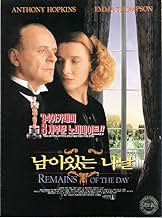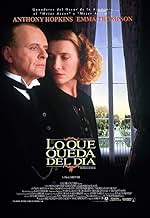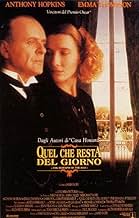A butler who sacrificed body and soul to service in the years leading up to World War II realizes too late how misguided his loyalty was to his lordly employer.A butler who sacrificed body and soul to service in the years leading up to World War II realizes too late how misguided his loyalty was to his lordly employer.A butler who sacrificed body and soul to service in the years leading up to World War II realizes too late how misguided his loyalty was to his lordly employer.
- Director
- Writers
- Stars
- Nominated for 8 Oscars
- 17 wins & 42 nominations total
Abigail Hopkins
- Housemaid
- (as Abigail Harrison)
- Director
- Writers
- All cast & crew
- Production, box office & more at IMDbPro
Featured reviews
I have never seen a love story told with such brilliance through subtext and performance. Every glance, pause, and unspoken word carries more weight than entire monologues in other films.
I used to think a film like this would be "boring" because "nothing happens." But watching it now, I realize everything happens!. It's about all the things left unsaid, all the moments missed, and how dignity and duty can become prisons. It's deeply moving, thought-provoking, and quietly shattering.
One of the finest literary adaptations I've seen. A slow burn, but by the end, it leaves you hollowed out . . .
I used to think a film like this would be "boring" because "nothing happens." But watching it now, I realize everything happens!. It's about all the things left unsaid, all the moments missed, and how dignity and duty can become prisons. It's deeply moving, thought-provoking, and quietly shattering.
One of the finest literary adaptations I've seen. A slow burn, but by the end, it leaves you hollowed out . . .
This is, in my opinion, the finest film in the Merchant Ivory canon. And to hail it as such is to grossly undersell it. It is not only that but also the best story of unrequited love in cinema history, and a masterpiece of understated emotion. It also boasts some of the finest performances ever put on film, most notably from the peerless Anthony Hopkins.
Then again, understatement is the key to this film. Writer Ruth Prawer Jhabvala and Director James Ivory adapt Kazuo Ishiguro's poignant novel with such delicacy that it gets under ones skin in a deeply profound way difficult to express in a few words.
The plot opens in the 1950's as meticulous and emotionally repressed butler Stevens (Anthony Hopkins) reviews a lifetime of service in Darlington Hall. The story flashes back to the 1930's where Stevens formed a close friendship with housekeeper Miss Kenton (Emma Thompson). This relationship grew slowly over several years and ultimately the pair developed romantic feelings for one another, although neither admitted it. Whilst all this was happening, Steven's employer Lord Darlington (Edward Fox) gradually became a misguided Nazi sympathiser in pre-war Europe. Unfortunately, loyalty to his master caused Stevens to reject the delicate advances of Miss Kenton. History took its inevitable course, and Darlington's involvement in appeasement contributed to the outbreak of World War II. Now Stevens realises he made a mistake and wants to make amends.
To describe Anthony Hopkins as brilliant is completely redundant. His turn here goes way beyond mere acting, and it was criminal he was denied the Oscar at the 1994 Academy awards. Stevens absurdly repressed personality gently takes the audience from laughter to tears in the most emotionally devastating finale I have ever seen. Hopkin's mesmerising performance is matched by a career-best turn from Emma Thompson. The supporting cast is uniformly superb, including a pre-Four Weddings Hugh Grant and Christopher Reeve in one of his last roles before the accident that paralysed him.
Needless to say, the cinematography, music, editing and art direction are immaculate. The understated beauty of the English countryside that was so important to the book translates brilliantly to film here.
This is a lovely, melancholic film, which effortlessly embraces complex themes such as misguided loyalty, dignity, pride, wasted lives, and unrequited love. It would be all too much to bear if it weren't for the film's genuine good-humoured understanding of English culture (all the more remarkable for having been initially penned by a Japanese author). In fact, humour is an important element in the film. There are many laugh-out-loud moments, which make the tragic part of the story all the more real and poignant. All in all, The Remains of the Day is a milestone film an unforgettable tragedy of a man who pays the terrible price of denying his own feelings.
Then again, understatement is the key to this film. Writer Ruth Prawer Jhabvala and Director James Ivory adapt Kazuo Ishiguro's poignant novel with such delicacy that it gets under ones skin in a deeply profound way difficult to express in a few words.
The plot opens in the 1950's as meticulous and emotionally repressed butler Stevens (Anthony Hopkins) reviews a lifetime of service in Darlington Hall. The story flashes back to the 1930's where Stevens formed a close friendship with housekeeper Miss Kenton (Emma Thompson). This relationship grew slowly over several years and ultimately the pair developed romantic feelings for one another, although neither admitted it. Whilst all this was happening, Steven's employer Lord Darlington (Edward Fox) gradually became a misguided Nazi sympathiser in pre-war Europe. Unfortunately, loyalty to his master caused Stevens to reject the delicate advances of Miss Kenton. History took its inevitable course, and Darlington's involvement in appeasement contributed to the outbreak of World War II. Now Stevens realises he made a mistake and wants to make amends.
To describe Anthony Hopkins as brilliant is completely redundant. His turn here goes way beyond mere acting, and it was criminal he was denied the Oscar at the 1994 Academy awards. Stevens absurdly repressed personality gently takes the audience from laughter to tears in the most emotionally devastating finale I have ever seen. Hopkin's mesmerising performance is matched by a career-best turn from Emma Thompson. The supporting cast is uniformly superb, including a pre-Four Weddings Hugh Grant and Christopher Reeve in one of his last roles before the accident that paralysed him.
Needless to say, the cinematography, music, editing and art direction are immaculate. The understated beauty of the English countryside that was so important to the book translates brilliantly to film here.
This is a lovely, melancholic film, which effortlessly embraces complex themes such as misguided loyalty, dignity, pride, wasted lives, and unrequited love. It would be all too much to bear if it weren't for the film's genuine good-humoured understanding of English culture (all the more remarkable for having been initially penned by a Japanese author). In fact, humour is an important element in the film. There are many laugh-out-loud moments, which make the tragic part of the story all the more real and poignant. All in all, The Remains of the Day is a milestone film an unforgettable tragedy of a man who pays the terrible price of denying his own feelings.
The crowning achievement of the Ismail Merchant/James Ivory partnership and their entire production team who give their absolute best in original music, cinematography, editing, art and set direction, costumes, and, of course, screenplay by Merchant/Ivory regular Ruth Prawler Jhabvala. Add flawless performances from the all-star cast and the result is almost too perfect. But there is just enough humility to this sad tale of unrequited love to make it completely believable.
Anthony Hopkins excels as the impenetrable Mr. Stevens, Butler of a lordly country house in the final days of the British Empire, and Emma Thompson is superb as his foil, Housekeeper Miss Kenton. Both give wonderfully deep, sensitive portrayals of two complex lonely people who don't realize, until it's too late, that they belong together. Swirling around them is fascinating drama of life upstairs and downstairs and there are as many surprises and sub-plots to the story (based on a novel by Kazuo Ishiguro) as there are secret passages, nooks, and crannies in "Darlington House."
An all-round first-rate cinematic experience, "Remains of the Day" is one of those pictures that lingers in the mind long after the credits pass. A must see. One poignant note: this was the return to the big screen of actor Christopher Reeve, as American millionaire Congressman Lewis, whose life nicely frames the storyline. Two years later Reeve became paralyzed after being thrown from a horse.
Anthony Hopkins excels as the impenetrable Mr. Stevens, Butler of a lordly country house in the final days of the British Empire, and Emma Thompson is superb as his foil, Housekeeper Miss Kenton. Both give wonderfully deep, sensitive portrayals of two complex lonely people who don't realize, until it's too late, that they belong together. Swirling around them is fascinating drama of life upstairs and downstairs and there are as many surprises and sub-plots to the story (based on a novel by Kazuo Ishiguro) as there are secret passages, nooks, and crannies in "Darlington House."
An all-round first-rate cinematic experience, "Remains of the Day" is one of those pictures that lingers in the mind long after the credits pass. A must see. One poignant note: this was the return to the big screen of actor Christopher Reeve, as American millionaire Congressman Lewis, whose life nicely frames the storyline. Two years later Reeve became paralyzed after being thrown from a horse.
In the WWII era, Mr Stevens (Anthony Hopkins) is a well experienced, dedicated butler who's loyal to his pro-Nazi master. He is always placid and graceful. Miss Kenton (Emma Thompson) is a new housekeeper and her liveliness and wit somehow touches Mr Stevens' very soul. But he conceals his feeling towards her, and she can never unlock that closed door of his heart.
Mr Stevens looks back on all this while on a road trip for meeting Miss Kenton after twenty years. He now serves a new master, Lewis (Christopher Reeve) who was once one of the guests of his formal master back in the 1940s. On the way his memory slowly flows back to him (and he also realises that his formal master was not an impeccable man after all)...when Mr Stevens and Miss Kenton bid farewell again, she looks into his eyes while her tears roll down her cheeks...a very sad scene.
'The Remains of the Day' is about love that is never obtained...love that is never verbally expressed...love of which you finally has to let go...having read the book (which is finely written), I realise that this film is a wonderfully successful adaptation. Anyone who's into love stories should watch this.
Mr Stevens looks back on all this while on a road trip for meeting Miss Kenton after twenty years. He now serves a new master, Lewis (Christopher Reeve) who was once one of the guests of his formal master back in the 1940s. On the way his memory slowly flows back to him (and he also realises that his formal master was not an impeccable man after all)...when Mr Stevens and Miss Kenton bid farewell again, she looks into his eyes while her tears roll down her cheeks...a very sad scene.
'The Remains of the Day' is about love that is never obtained...love that is never verbally expressed...love of which you finally has to let go...having read the book (which is finely written), I realise that this film is a wonderfully successful adaptation. Anyone who's into love stories should watch this.
Excellent film that was overlooked in 1993 due to the dominance of "Schindler's List", "The Remains of the Day" is an exquisite film which examines the relationship between two servants in England (Anthony Hopkins and Emma Thompson, both Oscar-nominated). They both definitely have feelings for each other, but both seem to be bound by duty, honor, and society. Hopkins is not the type of person who shares his inner-most feelings with anyone and Thompson wants to share her hidden love for Hopkins, but is frightened for various reasons. The fact that the film is told during flashbacks which took place just before the involvement of England in World War II just makes everything that much more interesting and heart-wrenching. During the present-day of the movie it appears that Hopkins and Thompson will finally proclaim their love for one another, but in the end that is not even a real certainty. Ruth Prawer Jhabvala's adaptation of the novel is exceptional and James Ivory's direction has rarely been better or more focused. With all this said, it is Hopkins and Thompson that dominate the action and make "The Remains of the Day" one of the best films of the 1990s. 5 stars out of 5.
Did you know
- TriviaSir Anthony Hopkins, as a guest on Actors Studio (1994), said that he got tips on how to play a butler from real-life butler Cyril Dickman, who served for fifty years at Buckingham Palace. Dickman said "There's nothing to being a butler, really; when you're in the room, it should be even more empty."
- GoofsAs the camera recedes in the final aerial shot departing from the estate, it briefly reveals a modern, silver-colored hatchback automobile backed up to the left end of the building.
- Quotes
Miss Kenton: Why? Why, Mr. Stevens, why do you always have to hide what you feel?
- SoundtracksBlue Moon
Composed by Richard Rodgers and Lorenz Hart
- How long is The Remains of the Day?Powered by Alexa
Details
- Release date
- Countries of origin
- Official site
- Languages
- Also known as
- Lo que queda del día
- Filming locations
- Dyrham Park, Dyrham, Gloucestershire, England, UK(Darlington Hall: driveway and exterior of the Mansion)
- Production companies
- See more company credits at IMDbPro
Box office
- Budget
- $15,000,000 (estimated)
- Gross US & Canada
- $23,237,911
- Opening weekend US & Canada
- $1,528,982
- Nov 7, 1993
- Gross worldwide
- $23,240,144
- Runtime
- 2h 14m(134 min)
- Color
- Aspect ratio
- 2.39 : 1
Contribute to this page
Suggest an edit or add missing content





































